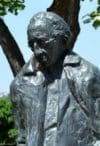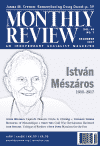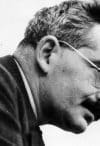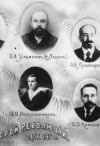Philosophy

Immanuel Wallerstein, the celebrated world-systems theorist and longtime contributor to Monthly Review and Monthly Review Press, died on August 31, 2019. Wallerstein first achieved international fame with the publication in 1974 of his The Modern World-System: Capitalist Agriculture and the Origins of the World-Economy in the Sixteenth Century (the first in a four-volume masterwork on the Modern World-System. We pay tribute to Wallerstein in this new issue of Monthly Review. | more…

Collectivity and individuality express two different aspects of Marxism’s humanist tradition, of how they ought to go together. It is another way to frame the dialectic of justice and jouissance, a radical hope for equality on the one side, plus a diversity of self-expression on the other. In a sense, this is not only what Marxism should offer; it is what any city should offer, too. Cities should reconcile problems of freedom and necessity, ought to provide affordable housing and a decent quality of life, alongside novelty of experience and scope for expansive individuality. | more…

Tamás Krausz Interviewed by Róbert Nárai
In the 1960s, Georg Lukács—under the slogan Back to Marx!—called for a “renaissance” of Marxism within Eastern Europe. To understand the nature of this renaissance, we have to understand the many important questions that the Hungarian uprising of 1956 raised for the anti-Stalinist left inside Hungary and Eastern Europe more broadly. This interview looks at efforts to rethink the future of socialism from the Eastern European situation in the second half of the twentieth century, including the political lessons of 1968, the internal fight within the Hungarian Socialist Party, and the continued relevance of V. I. Lenin’s Marxism. | more…

Following two key themes in Karl Marx’s thought—estrangement and political economy, in their relation to human self-knowledge—labor mediates the social metabolism. In this schema, organic (or functional) metabolism is distinguished from extended metabolism (or social organization). Socially extended metabolism gives rise to shared values and concepts in the same way that organic metabolism gives rise to life. On this basis, I suggest that both the subject and object of human self-knowledge is a socially extended self, which can connect to itself only when humans freely participate in socially extended metabolism—that is, economy, science, and industry. Estrangement, in contrast, is seen to result from a disruption within socially extended metabolism. | more…

Against attempts to characterize Marx as a dogmatic and deterministic thinker, it is precisely the open-endedness of his criticism that accounts for historical materialism’s staying power. This openness has allowed Marxism to continually reinvent itself, expanding its empirical and theoretical content and embracing ever larger aspects of historical reality. | more…

István Mészáros, who died on October 1 at the age of eighty-six, was a leading Marxist theorist and a frequent contributor to MR. No political philosopher of our age has reached nearly so far in joining philosophy with political-economic critique, or in systematically addressing the question of the movement toward socialism. | more…

Benjamin’s philosophy presents problems best addressed not academically, but in dialogue with living political processes. And it is in Latin America, particularly Venezuela, that Benjamin’s ideas have been most vividly illustrated and interrogated. | more…

For a century, the counterrevolutionary reaction to the events of October 1917 has arguably been the most determining ideological factor in Western politics. Today the victory of that counterrevolution is complete, but Western powers still need their inherited antithesis, in changing form, as self-justification. | more…

Russell was both a liberal and a socialist, a combination perfectly comprehensible in his time, but almost unthinkable today. As a liberal, he opposed concentrations of power in all its military, governmental, and religious manifestations. But as a socialist, he equally opposed the concentrations of power stemming from the private ownership of the means of production, which therefore had to be put under social control. | more…

Since Trump’s election, mainstream commentary has generally avoided the question of fascism or neofascism, preferring instead to apply the vaguer, safer notion of “populism.” In today’s political context, however, it is crucial to understand not only how the failures of neoliberalism give rise to neofascist movements, but also to connect these to the structural crisis of concentrated, financialized, and globalized capitalism. | more…

What can a class analysis tell us about fascism’s national particularities and early forms? Why was there no mass movement for a separate fascist party in the United States? The lessons of several now-forgotten works of scholarship from the 1930s are critical to our understanding of American fascism—not only for what they tell us about its history, but also about how to fight it today. | more…

The Return of Neoliberalism in Argentina
Argentina has long been plagued by cycles of economic mismanagement, including multiple failed neoliberal experiments. Before his election as president, Mauricio Macri promised resumed growth, an export boom, lower inflation, a smaller budget deficit, and less poverty. Since then, has the new neoliberalism outperformed the old? | more…











